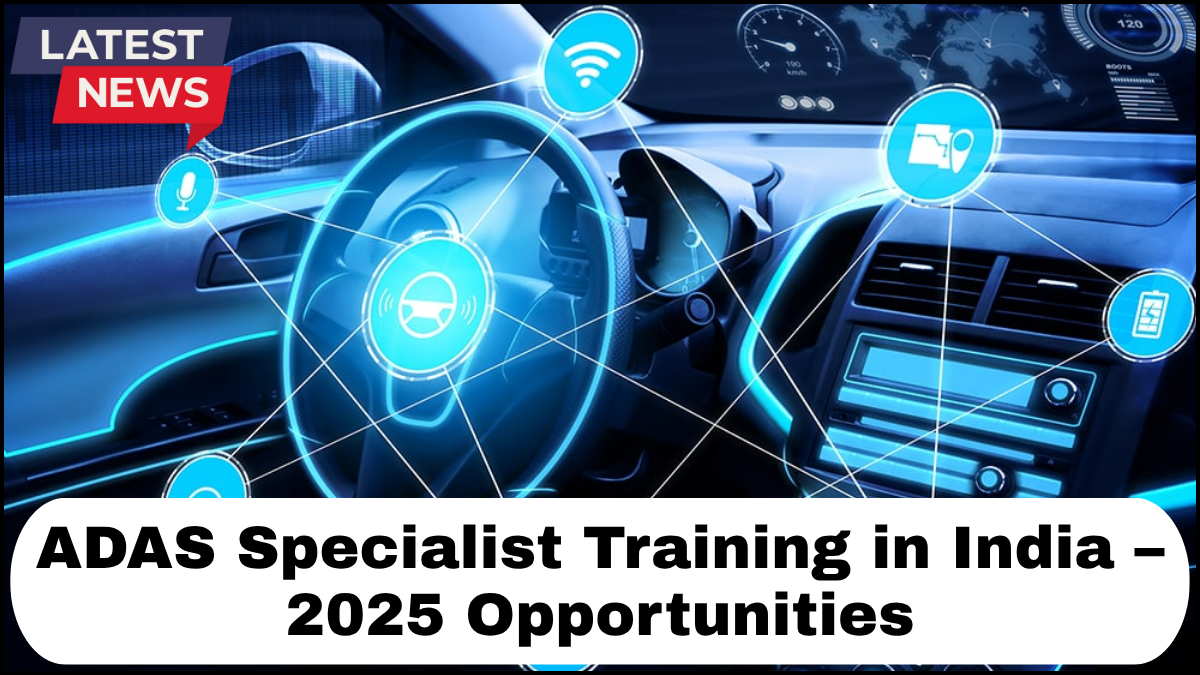With the automotive industry rapidly evolving, ADAS Specialist Training has become one of the most sought-after career paths in India. As Advanced Driver-Assistance Systems (ADAS) continue to gain ground in modern vehicles, the need for professionals skilled in these technologies is rising fast. By 2025, India is expected to see a surge in demand for trained ADAS specialists due to increasing automation, government regulations around vehicle safety, and the rise of electric and autonomous mobility solutions.

What is ADAS and Why is It Important?
Advanced Driver-Assistance Systems (ADAS) are technologies integrated into vehicles to improve driver safety, reduce human error, and support partial automation. These systems include features like adaptive cruise control, lane departure warnings, automatic emergency braking, parking assistance, and collision avoidance systems.
ADAS is a critical component of the move toward fully autonomous vehicles. In India, the adoption of ADAS has been relatively slow due to cost factors, road infrastructure, and awareness. However, with global OEMs setting up R&D hubs in India and government interest in safer mobility, ADAS technology is quickly gaining momentum.
Why Pursue ADAS Specialist Training in 2025?
As of 2025, ADAS Specialist Training is no longer a niche offering—it’s becoming a mainstream necessity. Here’s why:
1. Growing Adoption of Driver-Assist Technologies
Major automotive manufacturers like Tata Motors, Mahindra, Hyundai, and Maruti Suzuki are beginning to integrate Level 1 and Level 2 driver-assist systems into mid-range and premium models. This shift requires a robust talent pool trained in driver-assist systems training, including sensors, algorithms, testing, and integration.
2. Government Regulations and NCAP Ratings
The Bharat New Car Assessment Program (BNCAP), India’s vehicle safety rating system, is pushing OEMs to adopt ADAS for better crash test scores. This policy change is directly fueling demand for ADAS-certified professionals who can implement and validate these technologies.
3. Increased Investment in R&D
Global automotive tech firms such as Bosch, Continental, ZF, and Aptiv have significantly increased their R&D footprint in India. These companies are actively seeking engineers and technicians who have undergone specialized ADAS Specialist Training, particularly those familiar with sensor fusion, machine learning, radar calibration, and real-time system diagnostics.
4. Lucrative Career Opportunities
Professionals trained in ADAS enjoy high-paying, future-proof careers. Roles include ADAS system engineer, sensor integration specialist, calibration technician, software validation engineer, and more. Many global companies are also outsourcing their ADAS development to Indian talent, creating a robust job market.
What Does ADAS Specialist Training in India Cover?
Modern ADAS training programs in India are designed to provide hands-on, real-world skills aligned with global industry standards. Most courses, whether online or classroom-based, offer a mix of theoretical knowledge and practical application.
Core Modules Often Include:
-
Introduction to ADAS architecture and components
-
Sensor technologies: radar, lidar, ultrasonic, and vision systems
-
Sensor calibration and alignment techniques
-
AI and machine learning in ADAS algorithms
-
Real-time data processing and decision systems
-
System simulation, testing, and validation
-
ISO 26262 functional safety standards
-
Embedded systems and automotive communication protocols (CAN, LIN, etc.)
Leading institutions like ARAI, NPTEL, ASDC, and even private players such as Skill-Lync and Tech Mahindra offer driver-assist systems training as part of their automotive technology programs.
Who Should Enroll in ADAS Specialist Training?
The ideal candidates for ADAS training include:
-
Engineering graduates in Electronics, Mechatronics, or Automotive fields
-
Working professionals in the automobile or embedded systems industry
-
IT professionals looking to transition into automotive tech
-
Technicians and quality assurance specialists involved in vehicle testing
Prior knowledge of programming (Python/C++), embedded systems, and control theory can be advantageous.
Future Outlook: ADAS in India by 2030
By 2030, ADAS is expected to be standard in most new cars sold in India. As semi-autonomous driving features become essential, the industry will need tens of thousands of trained specialists. Whether in development, testing, or after-sales support, the scope for ADAS professionals will only expand.
Training now, in 2025, positions you ahead of the curve in a high-demand sector that blends innovation, engineering, and real-world impact.
Frequently Asked Questions (FAQs)
Q1: Is ADAS Specialist Training suitable for freshers?
Yes, many training programs are tailored for entry-level candidates with a background in engineering. Some even offer foundational modules to build core concepts from scratch.
Q2: How long does it take to complete an ADAS training program?
Depending on the program, it can range from 2-week bootcamps to 6-month in-depth certification courses. Online, hybrid, and classroom options are available.
Q3: What is the average salary for an ADAS specialist in India?
Entry-level ADAS professionals can expect salaries starting from ₹5–8 LPA, while experienced specialists with 3+ years can earn upwards of ₹15–20 LPA.
Q4: Do I need to know programming to enroll in an ADAS course?
Basic knowledge of programming is helpful, especially in C++, Python, or MATLAB. However, many beginner programs include introductory coding modules.
Q5: Are there government-approved ADAS training programs in India?
Yes, institutes like ARAI, ASDC, and NPTEL offer government-recognized certifications, often in collaboration with industry leaders.
click here to learn more